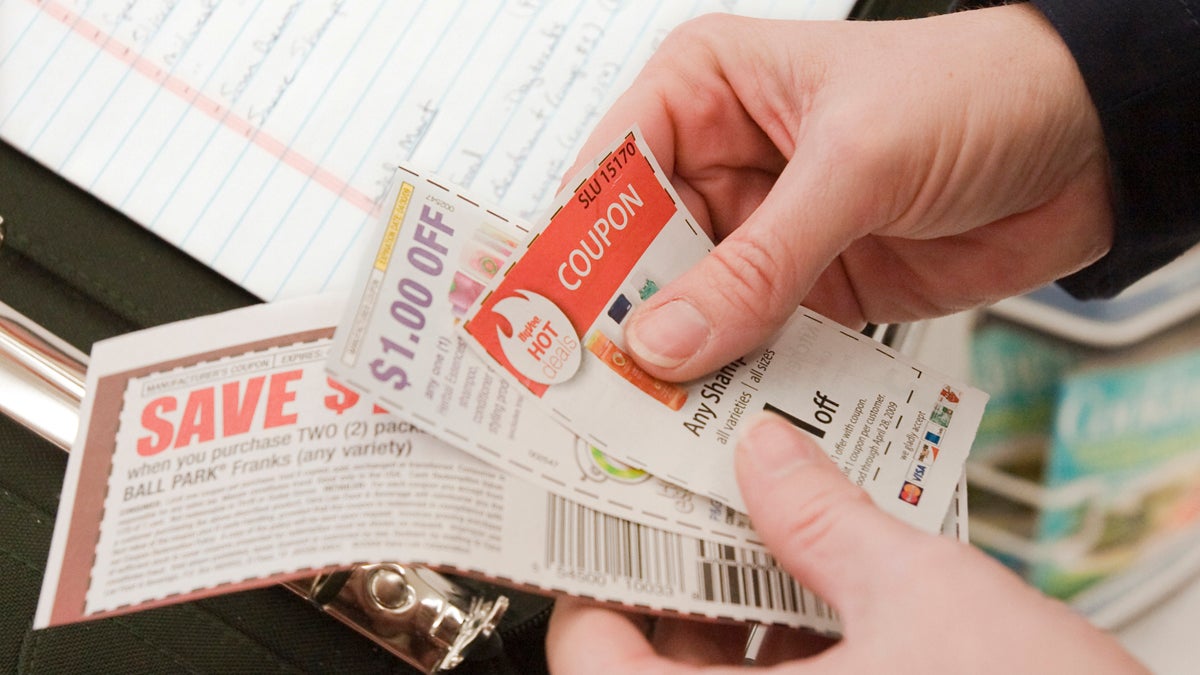Thinking better of money-saving ‘tips’

(AP Photo/Nati Harnik, file)
Recently I was reminded of the Countess of Coupons. Once a staple of local news, she’d head to a grocery store wielding a thick file of coupons. Trailed by cameras, she’d fill her cart to overflowing and proceed to the checkout, where she would owe little or nothing.
She wasn’t particular about brands. She didn’t mind buying in bulk. She didn’t even appear to care if her family used the product. The countess lived in the money-saving moment. Watching her on television, my father commented that he’d like to see her garage, filled, he was certain, with cartons of dried-up school paste, boxes of congealed detergent, crumbling rolls of masking tape, and multi-packs of expired D batteries.
Coupons aren’t as generous or popular as they once were, and it seems that the Countess has hung up her scissors and left the supermarket. I think she’s still around, though. I believe she works for AARP. My theory is that she helps with the annual AARP Bulletin feature, “99 Great Ways to Save.”
It’s full of mostly useful ideas, but there are a few that remind me of that woman pushing a mountain of Tang and Twinkies through the aisles — meaning that they need just a smidge more time in the mental oven. For example:
Convert money into $50 bills.
The idea is that people reconsider spending if they have to break a big bill. Depending on the shop, using a fifty may prevent them from spending at all. Even if your coffee place accepts President Grant, the barista probably prefers that you not pay for an itty-bitty latte with him. Using fifties will help you make friends, though, as you explain what a $50 bill is, and why you’re holding up the line using one.
See if you or someone you know has an unclaimed pension.
Who forgets a pension? Especially if it’s solvent. If you have, allow me to introduce myself: I’m the beneficiary you also forgot about. Increasingly, the nearest most Americans come to a pension plan is the team from Publisher’s Clearinghouse. We plan to wait by the front door for them to show up with balloons and a cardboard check. At least we don’t worry about forgetting.
Those 50 or older who have 401(k) plans can make a $5,500 catch-up contribution in 2013 in addition to their regular contribution.
This is actually an excellent recommendation, assuming that you:
Are employed (Congratulations!)
Have a 401(k) (Sweet.)
Remember that you have it (See above.)
Contribute to it (Good for you.)
Have an extra $5,500 (Check the sock drawer for a stack of $50s.)
It is typically cheaper to keep children under 25 who live with you and drive on your automobile insurance policy.
Cheaper than what?
Many stores offer special discounts to older people on certain days.
This sounds great, but think it through. Say your favorite market, Whole Lotta Food, gives seniors 5 percent off on Tuesdays, and you, having reached the required age and it being Tuesday, hurry right over. You may well find aisles choked with carts and basket-scooters operated by people who have not driven since the Clinton administration. In the produce department, bins will likely be emptied from the bottom up because, as even middle-aged shoppers know, height and flexibility are the first things to go. With the low-hanging fruit gone, the area is a phytochemical avalanche just waiting for a health-conscious shopper — you — to pull out the wrong Granny Smith.
Grocery loyalty programs, which allow shoppers of any age to accumulate points for, let’s say, free Thanksgiving turkeys, are equally dubious. Consider: Do you want to be in the freezer section when harried shoppers arrive to claim the gobblers they’ve been working toward since Labor Day? Picture yourself, for example, at Eat and Be Healed Victuals late in November, dodging slippery 20-pound blocks of free-range, humanely harvested turducken. What you save on the main course may be needed for ibuprofen.
AARP suggests bidding at Goodwill’s online auction site.
First, Goodwill holds auctions?
Second, do people in their sixth, seventh, or eighth decades of life generally need more stuff? Doesn’t this idea have you-know-who’s fingerprints all over it?
Shop for savings rates.
How quaint. Remember when banks paid measurable interest? And even gave out small appliances? They were the good old days of branch banking, and I bet the Countess of Coupons was the first one in line. Returning to the present, don’t choose a bank for the interest it pays. The smarter approach is to avoid the fees they love to bury in accounts.
For instance, a bank we will call Too Big To Fail Financial (TBTF) recently informed interest-checking customers that they have to maintain higher balances or pay a monthly fee. At current rates, paying the fee just once equals about 17 years of interest.
Some TBTF customers opted to trade down to basic checking, but even they aren’t off the hook. Too Big, taking the phrase no-interest literally, stripped away not only the minute monetary perk but many tiny services that customers might not have realized they were getting, and for which they will now be charged. So shopping bank fees rather than rates, for the foreseeable future, is the way for most savers to go.
If my theory about the Countess is correct, I am reassured to know that the she’s landed on her feet. As noted, most of the “99 great ways to save” are practical and useful to people of any age. I would offer just one more:
When you think you’re saving money, think it through.
WHYY is your source for fact-based, in-depth journalism and information. As a nonprofit organization, we rely on financial support from readers like you. Please give today.

